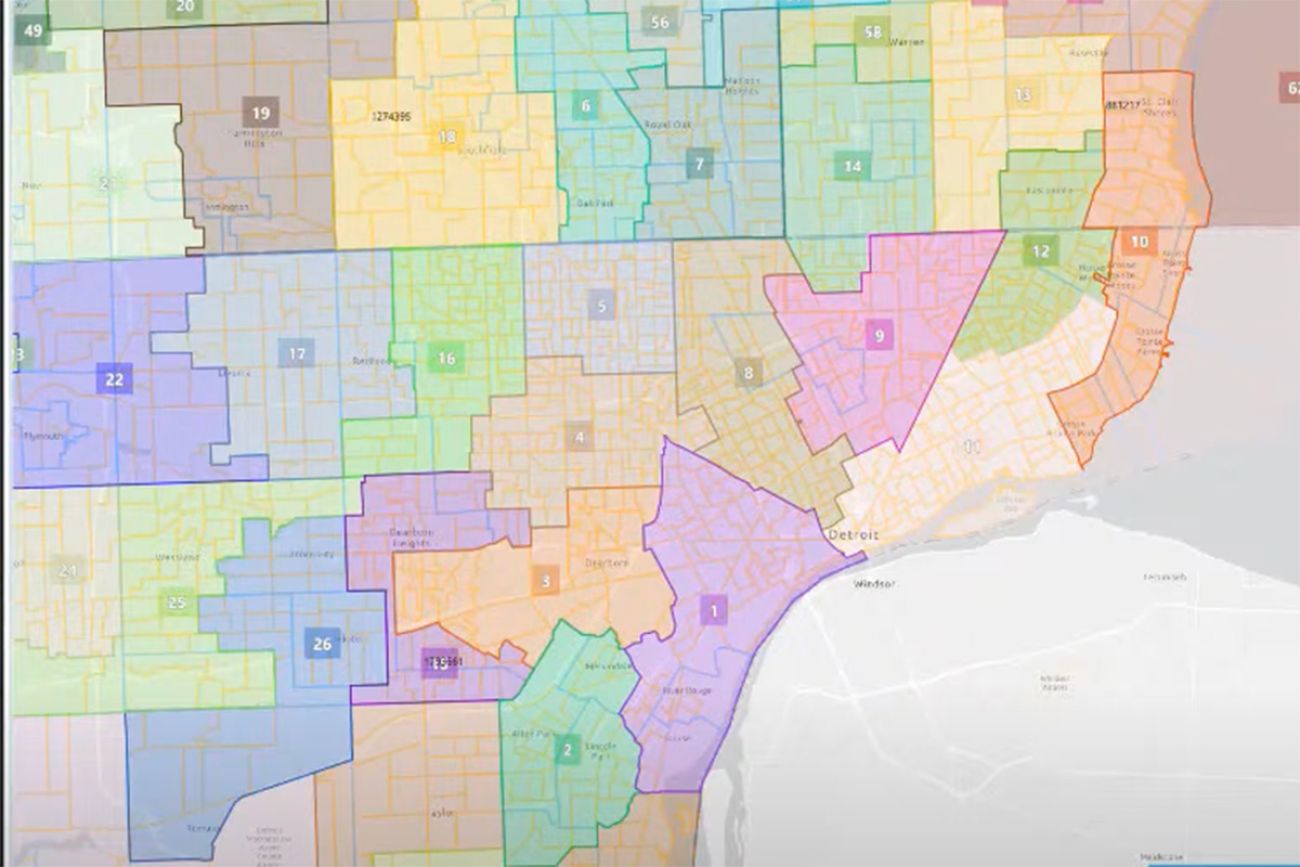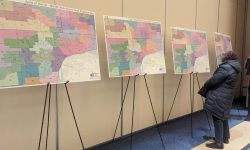Detroit area redistricting effort continues: Five things to know

- Michigan mapmakers consider several options for future Detroit-area House districts in the first week of a court-ordered redraw
- Standing court order requires new maps by March 29, even as redistricting commission appeals the order to U.S. Supreme Court
- The commission is holding in-person public meetings in Detroit next week to continue the mapping process and receive public input
Michigan’s redistricting commission restarted the mapping process for metro Detroit state House districts this week, attempting to adhere to court orders to leave racial demographics out of it.
After a Dec. 21 federal court ruling threw out 13 state House and Senate districts, the three-judge panel ordered new state House maps in place by March 29.
Barring Supreme Court intervention, mapmakers must deliver new political district lines after a group of metro Detroiters successfully challenged the current maps on grounds that commissioners improperly used racial data to dilute the power of Black voters.
Related:
- Benson: Redrawing Detroit districts by spring ‘threatens’ 2024 elections
- Federal judges set aggressive timeline to redraw state House district maps
- Can Michigan redistricting panel play nice, draw legal maps? It may get messy
Federal judges found that commissioners repeatedly used map-drawing tools at their disposal to “identify high-density African-American communities and then to dilute them.”
Commissioners have an aggressive mapping schedule planned in an attempt to meet the deadline, and next week will meet in person for the first time in months to hear directly from metro Detroit residents.
But the legal drama isn’t over — the commission appealed the federal panel’s ruling to the U.S. Supreme Court, and Secretary of State Jocelyn Benson has separately asked the nation’s highest court to delay any changes until after the 2024 elections to avoid electoral chaos. It’s unclear whether the justices will hear either appeal.
Here’s what to know.
1. New House maps by spring, for now
The state commission is complying with the federal order even as it seeks to have the U.S. Supreme Court overturn it.
Under an aggressive schedule ordered by the three-judge federal panel, the commission will need to post a new state House draft map for public comment by Feb. 2. That allows nearly two months to finalize the boundaries.
The commissioners agreed to meet over 12 days between Jan. 16 and Feb. 1 in a mix of virtual meetings and in-person sessions in Detroit to work through the mapping process.
Once a draft map is agreed to, a public comment period will run through Feb. 23. The commission’s final product is due in court by March 1.
Following review by plaintiffs and court-appointed experts, the court will approve a new slate of metro Detroit House districts by March 29.
If the commission can’t get that done, the court has a backup plan. Political science professor Michael Barber of Brigham Young University was tasked to come up with an alternate version in the event the commission’s House plan doesn’t meet court expectations.
2. Redraw may impact other districts — or not
In the early stages of the mapping process, commissioners created and worked from three draft maps for new Detroit-area political districts.
Two of the drafts would go well beyond court-ordered changes and create broad implications for the entire region, impacting state House Districts 1 through 14. Technically, commissioners are only on the hook for fixing Districts 1, 7, 8, 10, 11, 12 and 14, though the court allowed for tweaks to other districts if necessary to meet constitutional requirements.
Affected districts
A three-judge panel in December deemed the following state political districts unconstitutional and ordered them redrawn. Reconfiguring the districts could affect adjoining ones as well, causing other changes. Here are the ones at issue:
- House District 1, represented by Rep. Tyrone Carter, D-Detroit
- House District 7, represented by Rep. Helena Scott, D-Detroit
- House District 8, represented by Rep. Mike McFall, D-Hazel Park
- House District 10, represented by House Speaker Joe Tate, D-Detroit
- House District 11, represented by Rep. Veronica Paiz, D-Harper Woods
- House District 12, represented by Rep. Kimberly Edwards, D-Eastpointe
- House District 14, represented by Rep. Donavan McKinney, D-Detroit
- Senate District 1, represented by Sen. Erika Geiss, D-Taylor
- Senate District 3, represented by Sen. Stephanie Chang, D-Detroit
- Senate District 6, represented by Sen. Mary Cavanagh, D-Redford Township
- Senate District 8, represented by Sen. Mallory McMorrow, D-Royal Oak
- Senate District 10, represented by Sen. Paul Wojno, D-Warren
- Senate District 11, represented by Sen. Veronica Klinefelt, D-Eastpointe
The third draft, created Thursday, primarily focuses on changing the area covered by seven state House districts deemed unconstitutional by the federal three-judge panel.
Commissioners primarily relied on population and geographical data to put together the latest iterations, forgoing racial data altogether on the advice of their attorneys.
The mapmakers didn’t immediately have partisan fairness data available, meaning the initial drafts don’t take into account how the changes would impact Michigan’s overall political makeup. All of the Detroit-area districts affected by the court order trend heavily Democratic. But significant changes to districts stretching into suburbs could alter the overall partisan balance in Republicans’ favor.
3. Court fight continues
The state redistricting commission must comply with the court order for now, but has appealed to the U.S. Supreme Court in a final attempt to preserve the current maps.
Secretary of State Jocelyn Benson added an additional wrinkle to the case this week, asking the U.S. Supreme Court to hold off any redraws of metro Detroit’s state legislative districts. In a Wednesday court filing, her office argued that changing the map before the 2024 summer primary “threatens an orderly administration” of the election.
“Until a new plan is drawn … it remains uncertain whether the Secretary can put in place district changes without risk of error or disruption to the August 2024 primary election,” the filing reads, adding that the possibility of other court-ordered changes in coming months could leave election officials, candidates and voters “whipsawed.”
Attorneys for the metro Detroit voters challenging the commission’s work contested Benson’s argument, asking Supreme Court justices to let the lower court’s order stand and allow the redrawing prior to 2024 elections to proceed.
4. Senate redraw tabled
For now, a determination on the six Senate districts included in the case will come later.
The federal judges determined that the request by Detroit voters who sued the commission to hold special elections in those districts wouldn’t be possible in 2024.
The plaintiffs sought 2024 Senate changes in addition to the House districts, proposing special elections in at least six state Senate districts two years into the current four-year term.
Judges ultimately sided with Benson and the Michigan Senate, finding that option would leave some voters being represented by a lawmaker they didn’t elect.
A hearing to determine next steps for those districts is set for April 12.
5. Next step: Public hearings
Next week, the commission’s House mapping sessions will be held in person at Huntington Place and Cadillac Place in Detroit in an effort to solicit public feedback on the redrawn maps.
The commission’s schedule next week is as follows:
- Monday, January 22 from 10:00 a.m.-3:00 p.m. and 6:00-8:30 p.m. at Huntington Place, One Washington Boulevard
- Tuesday, January 23 from 10:00 a.m.-3:00 p.m. and 6:00-8:30 p.m. at Huntington Place
- Wednesday, January 24 from 10:00 a.m.-5:30 p.m. at Cadillac Place, 3044 W. Grand Boulevard
- Thursday, January 25 from 9:00 a.m.-5:30 p.m. at Cadillac Place
- Friday, January 26 from 9:00 a.m.-5:30 p.m. at Cadillac Place
Following the in-person mapping sessions, commissioners will reconvene the following week to make adjustments and finalize a draft map for further public review.
See what new members are saying about why they donated to Bridge Michigan:
- “In order for this information to be accurate and unbiased it must be underwritten by its readers, not by special interests.” - Larry S.
- “Not many other media sources report on the topics Bridge does.” - Susan B.
- “Your journalism is outstanding and rare these days.” - Mark S.
If you want to ensure the future of nonpartisan, nonprofit Michigan journalism, please become a member today. You, too, will be asked why you donated and maybe we'll feature your quote next time!




